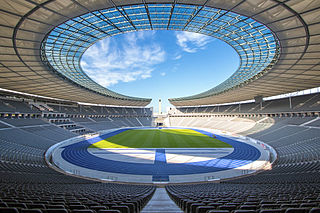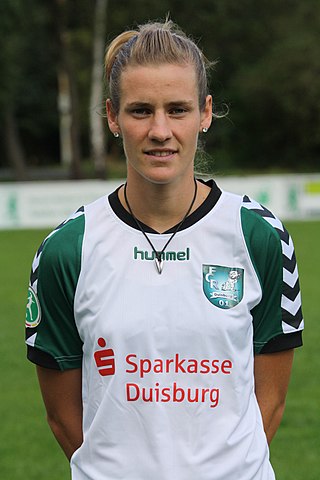
1. Fußball-Club Kaiserslautern e. V., also known as 1. FCK, FCK, FC Kaiserslautern, K'lautern or colloquially Lautern, is a German sports club based in Kaiserslautern, Rhineland-Palatinate. In addition to football, the club also operates in several other sports.

Hamburger Sport-Verein e.V., commonly known as Hamburger SV or Hamburg, or HSV, is a German sports club based in Hamburg, with its largest branch being its football department. Though the current HSV was founded in June 1919 from a merger of three earlier clubs, it traces its origins to 29 September 1887 when the first of the predecessors, SC Germania, was founded.

The Bundesliga, sometimes referred to as the Fußball-Bundesliga or 1. Bundesliga, is a professional association football league in Germany. At the top of the German football league system, the Bundesliga is Germany's primary football competition. The Bundesliga comprises 18 teams and operates on a system of promotion and relegation with the 2. Bundesliga. Seasons run from August to May. Games are played on Fridays, Saturdays and Sundays. All of the Bundesliga clubs take part in the DFB-Pokal cup competition. The winner of the Bundesliga qualifies for the DFL-Supercup.

UEFA competitions, referred improperly by the mass media as European football, are the set of tournaments organised by the Union of European Football Associations (UEFA), generally in professional and amateur association football and futsal. The term was established in 1971 by the confederation to differentiate the men's football competitions under its administration, the first in history being held at a pan-European stage, from other international competitions carried out in the continent between 1960s and 1990s, such as the Inter-Cities Fairs Cup, International Football Cup and Karl Rappan Cup, Cup of the Alps, Balkans Cup and the restructured Mitropa Cup. All these tournaments were organised by private bodies and/or at least two national associations and concerning one of more regional areas of Europe, not being recognised by UEFA for historic-statistical purposes.

Football is the most popular sport in Germany. The German Football Association is the sport's national governing body, with 6.6 million members organized in over 31,000 football clubs. There is a league system, with the Bundesliga, 2. Bundesliga and 3. Liga on top. The winner of the Bundesliga is crowned the German football champion. Additionally, there are national cup competitions, most notably the DFB-Pokal and DFL-Supercup.

FC Bayern Munich is a German professional women's football team based in Munich, Bavaria. They currently play in the Frauen-Bundesliga, the top women's league in Germany.

Football in Berlin, the capital of Germany, has a long history. The city contributed 24 of the 86 founders of the DFB, the German Football Association. The DFB Cup Final has been held every year at the Olympiastadion since 1985.

Simone Melanie Laudehr is a German former footballer who played as a central midfielder or winger.
The 1903 German football championship was the first tournament sanctioned by the German Football Association (DFB) to crown a national champion. At the time, the newly founded DFB only had about 150 member clubs in 30 mostly local associations. Every champion of these associations was eligible for play in the championship. Additionally, associations from outside Germany were allowed to take part, such as the Prague association that sent her champion to Germany.
The 1905 German football championship was the third time clubs in Germany competed for the national title under the auspices of the German Football Association (DFB). There were eleven entries into the competition, marking a new record. For the first time, the holders were given an automatic spot in the competition, taken by VfB Leipzig who had won the 1903 German football championship and had reached the final in the year before, when the competition was annulled.
The 1906 German football championship was the fourth competition for the national championship of Germany. Held under the auspices of the German Football Association (DFB), eight teams competed for the title. For the first time only champions of regional football associations were admitted to the championship, excluding champions of local associations such as the Verband Magdeburger Ballspielvereine. An exception was the situation in Berlin where two associations — the Verband Berliner Ballspielvereine (VBB) and the Märkischer Fußballbund (MFB) — existed. Both their champions were admitted, as were defending champions Berliner TuFC Union 92. This led to three teams from Berlin competing in the final tournament.
The 1943 German football championship, the 36th edition of the competition, was won by Dresdner SC, the club's first-ever championship, won by defeating FV Saarbrücken in the final.
The 1944 German football championship, the 37th edition of the competition, was won by Dresdner SC, the club defending its 1943 title by defeating Luftwaffe team LSV Hamburg in the final.

The Futsal-Regionalliga Süd is the highest german futsal league. It consists of 10 teams and was introduced in the 2015-16 season with seven teams. The winner of each Futsal-Regionalliga takes part in the Deutsche Futsal-Meisterschaft to determine the German champion at the end of the season. The second-placed team has the chance to qualify for the Deutsche Futsal-Meisterschaft through a playoff round. The bottom teams of the Regionalliga are relegated directly or compete in a relegation playoff round. The Futsal-Regionalliga Süd is organised by the Southern German Football Association and includes the Federal States of Bavaria, Hessia and Baden-Wurttemberg.
The highest German futsal league is the Futsal Bundesliga, ten teams play against each other in the league system. At the end of the regular season there is a championship round in which the German champions are played out. The bottom of the table is relegated directly to one of the five subordinate regional leagues. The penultimate plays with the champions of the five regional leagues in a relegation. Among them, the second highest league is one of the five regional leagues, called the Regionalliga. The winner of the respective regional futsal league has the chance to take part in the qualifying matches (relegation) for the Futsal-Bundesliga. The Bundesliga champions qualify for the UEFA Futsal Champions League.

The Germany national futsal team represents Germany during international futsal competitions such as the FIFA Futsal World Cup and the European Championships. The German Football Association decided the foundation of a national team on 4 December 2015 within the context of a so-called Futsal Masterplan in order to participate in the qualification for the UEFA Futsal Euro 2018. Germany achieved their first international victory at Hamburg's 2,092-capacity Inselpark on 30 October 2016 in a friendly against England, which ended 5–3. Germany then played the qualification for the UEFA Futsal Euro 2018 but were eliminated in the preliminary round, finishing in third place in their qualifying group C with four points, above Estonia and behind group winners Latvia and Armenia.
The 1959–60 Hamburger SV season was the 13th consecutive season playing in the Oberliga Nord, the first-tier of football in the region. Hamburg also competed in this season's editions of the German football championship and the 1958–59 DFB-Pokal, which was contested in the late autumn of 1959.
The 1962–63 Hamburger SV season was the 16th and final season playing in the Oberliga Nord, the first-tier of football in the region, before the formation of the national Bundesliga in 1963. Hamburg also competed in this season's editions of the German football championship and the DFB-Pokal.
The Futsal Bundesliga is the highest League in the German futsal league system. The league is largely semi-professional, and the first season was played in 2021.









